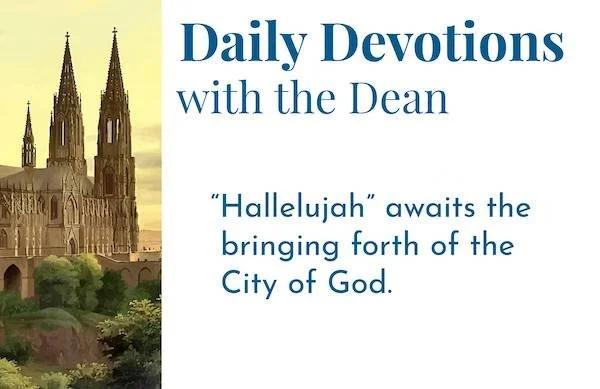Thursday • 11/16/2023 •
Thursday of the Twenty-fourth Week After Pentecost (Proper 27)
This morning’s Scriptures are: Psalm 34; 1 Maccabees 1:1-28; Revelation 19:1–10; Matthew 16:1–12
This morning’s Canticles are: following the OT reading, Canticle 8 (“The Song of Moses,” Exodus 15, BCP, p. 85); following the Epistle reading, Canticle 19 (“The Song of the Redeemed,” Revelation 15:3–4, BCP, p. 94)
Welcome to Daily Office Devotions, where every Monday through Friday we consider some aspect of that day’s Scripture readings, as given in the Book of Common Prayer. I’m Reggie Kidd, and I’m grateful to be with you. On this Thursday in the Season After Pentecost our readings come from Proper 27 of Year 1 in the Daily Office Lectionary.
Revelation 19. Many people are surprised to discover that the word “Hallelujah!” (which means “Praise Yah!”) does not occur in the New Testament until Revelation 19. All four incidences of the word in the New Testament lie here in this chapter—nowhere else. Neither the angels nor the shepherds use it at Jesus’s birth. The disciples don’t use it at Jesus’s resurrection or at Pentecost. Peter and Paul don’t use it at the Gentiles’ acceptance of the gospel.
It’s as though the Holy Spirit were holding the term back to signal the events of this special moment: the downfall of the whore of Babylon at the end of time, and the simultaneous elevation of the Bride of Christ.
Throughout the New Testament, “Hallelujah” awaits the demise of the “City of Man,” because “Hallelujah” depends upon the destruction of humanity’s seduction by sin.
“Hallelujah!
Salvation and glory and power to our God,
2 for his judgments are true and just;
he has judged the great whore
who corrupted the earth with her fornication,
and he has avenged on her the blood of his servants” (Revelation 19:1b–2).
Throughout the New Testament, “Hallelujah” awaits the bringing forth of the “City of God” like a radiant bride. “Hallelujah” depends upon Christ’s bride being freed from external persecution, purged of internal division and error, and forever united in marriage to Christ her Groom.
“Hallelujah!
For the Lord our God
the Almighty reigns.
7 Let us rejoice and exult
and give him the glory,
for the marriage of the Lamb has come,
and his bride has made herself ready;
8 to her it has been granted to be clothed
with fine linen, bright and pure”—
for the fine linen is the righteous deeds of the saints (Revelation 19:6b–8).
The only response to the glory of this picture I can think of is the words of the hymn writer: “And Lord, haste the day when my faith shall be sight, the clouds be rolled back as a scroll.…”
1 Maccabees: introductory thoughts. In just over two weeks, we begin the season of Advent, a time of “leaning in” to hope. It is, first, hope realized, for Jesus has already come in humility. It is, second, hope yet-to-be-realized, for Jesus will come a second time in power and great glory.
In preparation for that season, the daily lectionary takes us on a tour of the events that led to the Jewish celebration of Hanukkah, the rededication of Ezra and Nehemiah’s temple following its desecration by pagans in the middle of the 2nd century B.C. The inter-testamental Book of 1 Maccabees recounts how the successors of Alexander the Great sought to undermine Israel’s mission of being a people set apart to the service of the Lord. And it’s the story of how Jews faithful to God’s covenant successfully resisted. It’s impossible to understand the climate of the times of John the Baptist’s emergence to call for a new exodus and rescue from slavery without understanding how these Jews of a previous generation had also looked to God for deliverance.
Jesus will eschew the violent sort of resistance to oppression that the heroes of 1 Maccabees mounted, but his zeal more than matches theirs. And it is not difficult to see in 1 Maccabees the kind of expectations that contemporaries of Jesus pinned on him. They hoped he would recreate against the Romans a military campaign similar to the one Judas Maccabeus had mounted against the Greek defilers of Jerusalem and the temple.
Matthew: Jesus always offers a third way. Just like everybody else, Jesus’s disciples play the short game. They think Jesus feeds the multitudes because he’s interested in bread for the masses. Jesus had already settled that question in the wilderness with Satan: “Man does not live by bread alone….” Instead, Jesus offers a bread that feeds the soul and remakes lives.
When his disciples panic because they’ve forgotten to bring food for a journey, he reminds them that they ought to know from his feeding of the 5,000 and the 4,000, that he’s perfectly able to take care of a lack of bread. But then, in what must have led to their even greater astonishment, he warns them of the “bread of the Pharisees” and the “bread of the Sadducees.” What he means, I think, is that the “bread” the Pharisees serve (similar to the Maccabean separatists) will not satisfy; nor will the “bread” the Sadducees offer (similar to the Maccabean assimilationists).
Jesus is the third way between separation and accommodation. Jesus came to be the Temple, the place where God dwells with his people. He did not come to purify a building. He came to purify a people. He came in “tenting” fashion at first, a frail newborn, but later fully capable of dying for sinners. He will come again in his glorified state, to be “God-with-us” permanently. And the Bread he offers is his own life for the world.
Be blessed this day,
Reggie Kidd+



